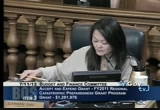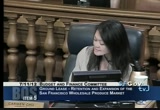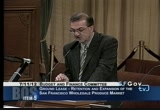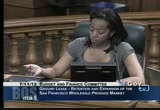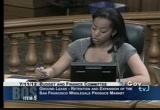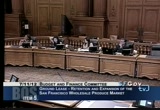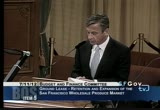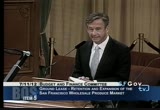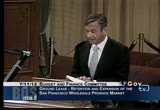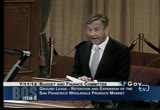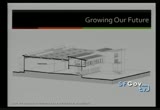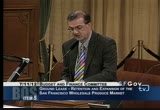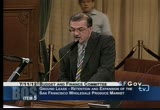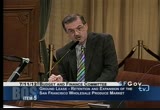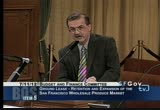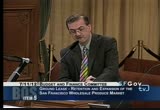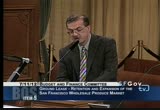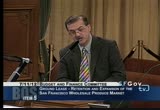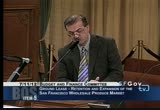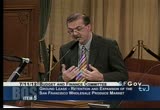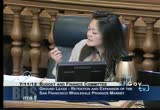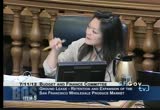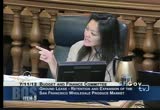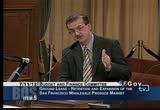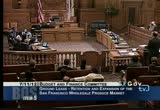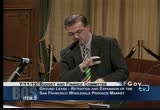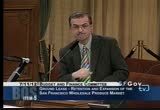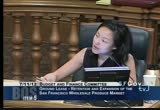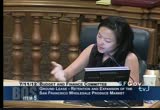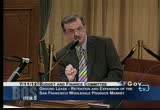tv [untitled] September 2, 2012 5:07pm-5:37pm PDT
5:07 pm
send the item forward with recommendations and we will do that without objection. item #4. >> item #4 -- the resolution authorizing the san francisco be sensible transportation agency to execute an agreement for parking meter coin collection counting and support services for an amount not to exceed $46,410,974 and for a term of five years with an option to extend the term for up to an additional four years. supervisor chu: do we have the mta here on this item? we don't. what we call item no. 5? >> resolution authorizing lease of real property and improvements done as the san francisco wholesale produce market, including the lease of property at 901 rankin street.
5:08 pm
authorizing the city administrator or designee to execute documents and make certain modifications and take certain actions in furtherance of this resolution. supervisor chu: this item is brought to is jointly by the mayor but also by supervisor cohen and the supervisor will join us shortly to say some words on behalf of this. until she comes, would you like to have any opening comments? >> good morning. and the acting director of real estate. when i began my position here in san francisco, the first project i was handed by my director was to move forward with the san francisco wholesale produce market least, knowing that in six short years, the 50- year lease was coming to an end. unfortunately, we started this
5:09 pm
six or seven years ago. there have been many interested parties working on this and balancing a number of interests. those interests or the economic development desires of the city, the ability of wholesalers to afford the rents that have revitalized market, concerns of institutional financing sources in a very tight credit environment, providing sufficient term of least to give all of the comfort that the city is serious about making this investment work, and institution -- instituting sufficient checks and balances to make sure the city property delivers on the promise that lays before you. i believe we have achieved that. if you would like to turn that over to supervisor cohen, we have a presentation that will serve the general manager of the san francisco wholesale produce market and i will follow-up with
5:10 pm
details on the lease itself. supervisor chu: thank you for that. i know that supervisor cohen is a co-sponsor and i will turn it over to you for comment. supervisor cohen: thank you for allowing me the opportunity to join you this morning. the produce market is a vital hub in the southeastern part of the city. for six years, have been supplying missile of fresh produce, employing local residents and distributing millions of dollars to payroll tax to our city. before slow food was fashionable, for decades, the produce market has been trying to increase food equity and our neighborhoods which have traditionally lack access to quality food. this new lease is a tremendous opportunity to build on the relationship the city has had
5:11 pm
with the market, corporations and small businesses that operate there. the item before you today provides the produce market with a new 60-year lease that will facilitate a large expansion of the market, updating facilities and creating new, expanded space for those who want to stay and grow in the city and tenants looking to locate their business here in the market. the structure and term of this lease will also facilitate significant private investment in the market's expansion through the use of new market tax credits and is faced -- a phased building output will average rent paid to finance new construction. these are exactly the kinds of private-public partnerships the city should be prioritizing. we have reviewed the budget analyst reports and understand the issues he has raised with the department of technology's relocation as well as the
5:12 pm
uncertainty on the date the city might receive net revenue proceeds from this lease. it is my hope we can have a thoughtful discussion about this project today and address any concerns that you as members of the budget committee may have so that we may be able to move this project forward. with that, we can begin our discussion. supervisor chu: thank you very much for the opening comments. >> good morning. i'm the general manager of the san francisco wholesale produce market and this is the project manager. we would like to thank you for the considerable time to have taken to experience and learn about the market. we thank you for your ongoing and strong leadership in our district 10 committee. on behalf of the entire market
5:13 pm
family, our customers and forming partners, we thank you for the opportunity to talk to about the future of the market, including the ground lease an investment project. but first we would like to share but of our history. our roots in san francisco, we have been in our current location since 1963 but our history goes back even further than that. many of our merchants sold fresh produce in the embarcadero in the old market district. in the 1960's, the market was moved to its current location to allow for the golden gateway redevelopment area. since then, san francisco has evolved to become famous for its food culture and the market has been an integral part of this. our merchants provide fresh produce to a multitude of independent retailers, restaurants, food trucks, hotels, caterers, corner stores and the list goes on. all of this makes san francisco a great and unique place to live and eat. tourists spent $1.6 billion
5:14 pm
annually in food and beverage year in 2010 and the market has been a key partner in that business. today, the market is comprised of 26 businesses with shared warehouse and dock space across five facilities. much of our work is performed behind the scenes. hour workday ends when the sun comes up. our passion is produce. we bring healthy and terrific tasting food to san francisco. but in a fragile, time sensitive product like produce is not easy. the professional that the market have a wealth of logic and know- how. it serves as an incubator for small food business. earl's organic began with a single desk on a rear docked at the market. today he and his business are in 25,000 square feet on the market providing organic produce locally and nationally. the market is an asset to the city beyond reasons for fresh
5:15 pm
and healthy eating. it's an anchor for jobs in the neighborhood with over 650 employees working at the market. of our employees, nearly one- third are residents percent -- are residents of san francisco. the market and merchants are engaged with the track driving academy for local hiring. we have and continue to work with jvs. worker of the year is a member of our maintenance crew and we are proud of that. at the market has -- the market touches many aspects of the city and we're the backbone for are independent food culture and economy. we are a purveyor to the neighborhood merchant corridor and many small businesses have been shopping at the market for many years. we have been donating to the san francisco food bank for countless years and now dominate over a hundred thousand pounds of fresh produce each year. there is a san francisco food bank track at the market every
5:16 pm
morning going from business to business to collect produce. the market is and invests in -- is an invested participant in many things it dropped at bay area. we are members of many organizations within the bay area. the market infrastructure is critical to the bay area food shed. we are the link between nearby farms and their customers in the city and provide all the services that move produced from farm to fort. but the market has done since we began in 1963 as provide infrastructure and that is what we need to be able to do and this lease will enable us to do that. a new ground lease will lay the foundation for a $100 million project to enhance and expand the market. this will position us to better serve existing and future customers demand while creating jobs. here is a photograph of the newest edition of the market which currently houses earl's organic produce. this is an example of where we would like to go with our other buildings.
5:17 pm
the reinvestment and tails upgrading and expanding five buildings. we will take a phased approach, developing the project over 10 to 15 years, focusing on one building and a time so we can maintain normal market operations. we will increase our capacity between 100,000 and 200,000 square feet and we're planning to minimize traffic conflicts. reinvesting in the core infrastructure is paramount to our future success. modern storage and distribution facilities will allow us to serve and attract high-quality produce businesses, reduce our environmental footprint and meet best practices and standards. in closing, even though much of our work is performed in the middle of the night, the benefits are clear as day. san francisco's food culture and the lore as a food destinations predicate of fresh, healthy cadaver's produce made available throughout the city. we provide critical infrastructure with our local and regional food system and
5:18 pm
continue to provide quality jobs that help businesses establish themselves and succeed in our community. thank you. supervisor chu: thank you very much. >> i would like to go into the details of the lease itself and the key terms and conditions and address some of the issues in the budget analyst reports. this is a 60-year lease with the sf market corp.. the negotiated term was elected to cover the entire reconstruction to completion, which could be out to 2036 and assuming a final tranche of debt that takes us out 54 years. with consideration for flexibility in the schedule, 60 years was deemed most
5:19 pm
appropriate. that term would provide comfort to the institutional financiers of project certainty which affects not just the interest rate due to the risk of the debt issue, but also address the basic viability of financing. we don't have a lot of term, financing may not be available from certain sources. a shorter term would make financing not only much more difficult but much more expensive. it also provides certainty to wholesalers. we're dealing with today the sons, daughters, grandsons and granddaughters of the vendors displaced by the market there redevelopment in the early 1960's. we're dealing with subtenants whose vision cuts across generations. we need to be consistent with that vision. this is admittedly a sole source leased but it is justifiably so. there are no developer profits, there are no developer fees, this is not a traditional
5:20 pm
development. the city is offering up simply a one time transfer of accumulated revenues from the existing market corp. to the new market corporation. along with the use of consolidated land at no additional cost, the city receives the benefit of the transaction downstream. upon completion of the project, and establishment of stabilize net revenues. we project it will be approximately 2036. it is not a precise number given that there are four phases and many complexities to the project, but we estimate the stabilize revenue flow will be approximately $1.5 million per year and that has a net present value for the remainder term for approximately $35 billion to the general fund. over the first 50 years of this lease, at what recognize we have a 50 year positive history on this site, there has been no net revenue flow to the city.
5:21 pm
we're changing that dynamic in this agreement. the project works because the only fiscal burden to the city is the replacement of a dilapidated world war two vintage facility. we knew we had to replace this on site or elsewhere. it has been previously articulated as a deferred or unfunded need. the remainder of the sources come from project revenues, the institutional financing, new market tax credits and potentially some federal sources. with regard to 901 rankin's relocations, we have to use is there -- one by the mta and one by the departure of technology. the mta is budgeted and approved for relocation. their relocations are set forth
5:22 pm
and on going to both their bancroft and marin facilities. that has been initially deemed consistent with the ongoing overall asset management review performed by a team of consultants assisting the mta on improving their space use. in addition to the infusion of funds from the city, -- to the city from the corporation, to a system covering rental costs by replacing a location or if we so choose, debt service if we purchase the replacement site. there are certain triggers in the least that need to lead to the relocation. the city has to find a suitable site. the corporation has to have certainty they have an anchor tenant to take the newly constructed space. we than mutually move forward subject to board approval of the transaction regarding a suitable replacement site that will
5:23 pm
return to this committee, as likely, and to the full board. we are looking very closely at to particular sites we think are well-suited to meet the needs. there is the potential there will be some right sizing of what they provide and we are considering that. in terms of what the replacement site might be, it may not be quite as large as the current site. the estimates of move costs and ongoing rental expenses are outlined a budget analyst report on pages 8 and 9 and reflect the reality of those particular sites we're looking at and the likely expenses. there is some reality to this figures. the proposed relocation site lease would be structured so the fiscal impact to the city does not commence until fiscal year 13-14.
5:24 pm
i want to talk briefly about checks and balances in the least. there are operational restraints in place where it is made clear the corporation must use commercially reasonable practices, achieve the project calls, maximize the revenues, and maintain a reasonable cost structure in operating the market. these are all quotes from least -- they must apply best practices of the international facility management association and those of the international right of way association in their transaction dealings with subtenants so we have clear metrics for performance. if they do not, a notice of defect could be provided by the city and the path of resolution is undoubtedly the lease. if not resolved fairly and expeditiously, the city could take the extreme step of removing them management team under the terms of the lease. given however the 50-year
5:25 pm
excellent working relationships of far, we do not foresee that day coming. yet we have built into the lease this worst-case scenario and resolution to that scenario. there are also robust reporting requirements along the way as we move through the phases of construction. these include approval requirements of this city that covers the development plan, the budget, the design, the leasing schedule, and the rent schedule. these are all protective measures to insure a fair and equitable process is used in providing subtenant agreements and revenue flows are maximized. that in our best interest so the commencement of net revenue to this city is as early as possible. these are joint mutual goals of the corporation, association, and the city. i want to thank monica and
5:26 pm
michael for their presentation and thank the council and our counsel who spent years putting this together. it has been a thoughtful process going forward. we would not be here without the support and guidance of the corporation board as well as the pros a source the asian board who has been a partner in this venture. -- the pros association board. some issues need to come together but it has been moved out of land use and to the full board and it will be considering that i am on july 17. supervisor chu: does that complete your presentation? i do have a few questions. with regard to the 50-year positive experience we have currently, i think the budget analyst report noted in your
5:27 pm
presentation and you relate we have not been receiving revenue at our current configuration. from my understanding, that the result of our actions through relocating the produce market from where it used to be from part of the redevelopment work. >> that is correct. the genesis is from the embarcadero we development in the 1960's and the movement of this site to its current location in 1963 that started the current 50-year lease. >> so we moved to prevent -- supervisor chu: we moved them to their present location because of redevelopment and the benefit -- that was sort of a structure we created? >> that's right. it really was a community- driven process to create the purchase of this site and a gift of deed and leaseback that was orchestrated and the early 1960's by key san franciscans to
5:28 pm
move it forward. supervisor chu: i want to clarify one component -- you talked about the 11,000 or $12,000 a month to help with the relocation of the mta and department of technology for 15 years. that totals about $2 million. the way i understand the financial structure to work for the capital improvements to work, is that the net revenue -- is that going to be put back into paying the capital improvement for the first 20 years? is this revenue to offset the department of technology and mta, is that on top of this capital work? >> that is correct. the $2 million is in addition to the $100 million estimated for the actual capital production.
5:29 pm
that was a negotiated figure. we needed to create tolerance for sufficient moneys to the city that would at least assist in the relocation but not overburden the project and stretch it out. we wanted to have the capital project concluded as quickly as possible so net revenues can flow to the city quicker. supervisor chu: in terms of the financials, from now until 2036, that's going to be a time in which the city does not believe we will be receiving any revenue coming in from the produce market because that revenue is being put back into paying the debt service for the capital improvements through the various phases. after 2036 is what we expect to see that $1.5 million in revenue annually? >> that is correct. the city is not in fusing any additional capital to move the project ford, has to survive and grow based on the existing
5:30 pm
revenue streams from existing tenants and other non-city sources with the exception of the capital reserve they have accumulated. supervisor chu: you mentioned in the earliest part of your presentation a reference to 54 years. why that was relevant to creating a 60-year term. i did not quite catch how you got 54 years. >> if one assumes institutional financing in a 30-year term for each project phase, if we look out to the last project, phase four of the project, which at its slowest would be concluded in 2036, you add it 30 years of debt on top of that and that takes you to 2066. we determined a 60-year term in consideration of other long-term leases seemed reasonable and that the tolerance level we were hearing from the institutional find answers like u.s. bank or
5:31 pm
bank of america who indicated long term commitment and the city was buying into the vision of all of the phases of being concluded was imperative in order to secure the financing from its institutions. >> the six -- supervisor chu: the 60-year lease is related to the financing mechanisms for the funding of this project? we're getting $107 million borrowed and invested over time basically? >> yes. supervisor kim: i do want to hear from the budget analyst because a number of concerns came from that report. back to the relocation and expenses for the department of technology and an t a, approximately $2 million a year. how was that number determined and tell me how the breakdown might be between 78 and
5:32 pm
department of technology. i know you have said mta has already included their relocation in their budget in the next two fiscal years. but i want to have a sense of are we reimbursing them for a portion of that and how much are we leaving for the department technology? what is the anticipated cost of relocation? supervisor chu: this is a -- >> this is a good opportunity to clear up some misconceptions. there's a reference to a range of somewhere between $500,000 to $800,000 for the department technology relocation. that is the ongoing likely cost in the rental scenario to make the move. somewhere between $500,000 to $800,000 a year just for the department technology. that and teammate a decision some years ago to relocate from 901 rankin, a facility for which they do not have
5:33 pm
jurisdiction. it was rightfully felt the mta, since they did not have rights to the building they were occupying, needed to execute their move within their budgetary capacity and they made that decision several years ago. the funding stream from the corporation to this city to assist in the relocation is solely to offset the department of technology costs. no funds will be moving to the mta. they are carrying the costs entirely within their budget, as is appropriate given the circumstances. supervisor kim: did mta determine their new site yet? >> they have. they're moving to two different sites. part of it is going to their bancroft facility which they recently required -- which the recently acquired. the other part is going to their marin facility. we checked in with a team looking at the asset management issues and confirmed as of most intelligent places for those two
5:34 pm
uses to go. that has been reconfirmed and those moves are underway. >> -- supervisor kim: bancroft has been acquired and marin is a lease situation? >> yes. supervisor kim: i know this has come up before, but we have a sense that there are other city properties to determine if technology can move to to save on expenses or is that a priority in terms of what we're doing that search? >> we have looked very hard at any city assets that might work. a couple of the sites we're looking had to afford some opportunities but within the city's inventory, frankly, it is a corporation yard. it is industrial in nature, which is difficult to site and we don't have much in the way of surplus. in fact, the mta is also looking for a corporation yard space or industrial space. hard to find in this city.
5:35 pm
we have exhausted our search of city assets and turned to the private sector for the best opportunities we can find. supervisor kim: in terms of the 901 rankin site, i understand the organization will be subleasing that out and we as the city will gain in net revenue of that site, first collected in to the tenant relocation and tenant improvements of that site. is there a mechanism you have discussed in terms of how they lease the site in terms of either minimums or a way of determining what is a fair rent? >> in all honesty, i would estimate -- i look at my colleagues, and i think two of
5:36 pm
the six years was spent on that. how to fairly set a schedule. not knowing what the market might be 30, 40, 50 years from now, yet rich enough to give us protection that their maximizing the sub net revenues and i think we struck an excellent balance. there is a leasing scandal that has to be submitted and that sets forth a market trend rate that is periodically adjusted based on a review and we define how something is comparable or not to the produce market because it has its own market. it is so large, to a degree they tend to set the market. we wanted to look beyond just that site and consider all factors on revenues. the city has a role in reviewing at and moving forward with its
116 Views
IN COLLECTIONS
SFGTV: San Francisco Government Television Television Archive
Television Archive  Television Archive News Search Service
Television Archive News Search Service 
Uploaded by TV Archive on

 Live Music Archive
Live Music Archive Librivox Free Audio
Librivox Free Audio Metropolitan Museum
Metropolitan Museum Cleveland Museum of Art
Cleveland Museum of Art Internet Arcade
Internet Arcade Console Living Room
Console Living Room Books to Borrow
Books to Borrow Open Library
Open Library TV News
TV News Understanding 9/11
Understanding 9/11